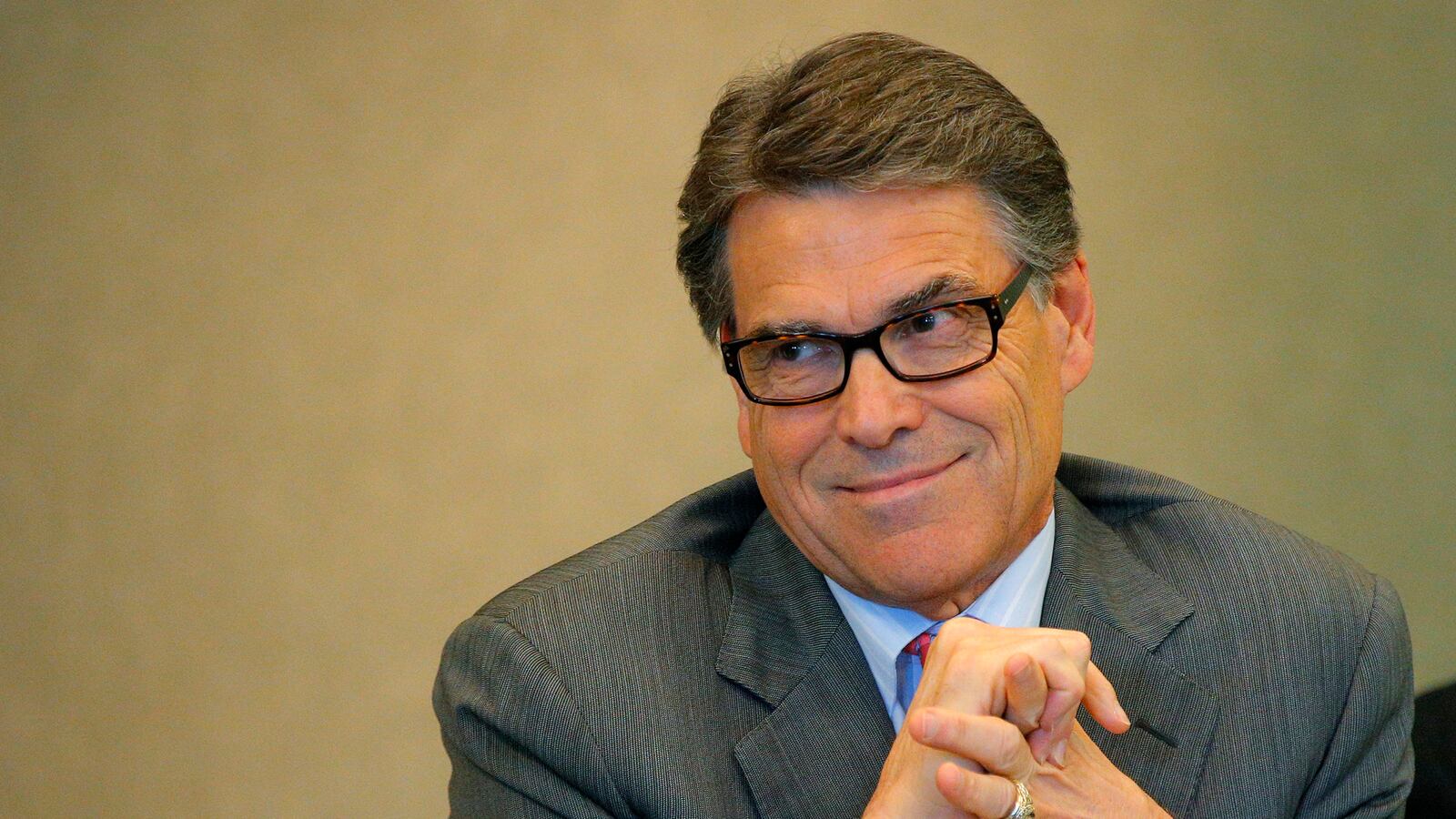Late for happy hour, a junior staffer sighs and starts in on a draft email announcing RickPAC, Rick Perry’s new political action committee. “Friend & Supporter,” it begins. The staffer stares at the screen. “We’re living during…”
During what? One of the lamest eras ever?
Okay, no. How about: “one of the most volatile periods since the Cold War.”
Twenty minutes later, the draft is finished. It pops up in the inbox of a communications staffer, also feeling overworked, who scans it quickly for groaners and gives it the thumbs up.
Rick Perry’s digital signature is tacked on at the end, and out it goes—to untold thousands of friends, supporters, hacks, flacks, and who knows who else. Never to be read, in some cases. Certainly never to be analyzed. Probably, there wasn’t much more to the fateful opening line that explained exactly why someone should want to invest in Rick Perry’s view of the world.
But what if the email’s framing could set off a change in Republican foreign policy? What if it could define the race for president in 2016?
Even a blind squirrel finds a nut sometimes. What if Rick Perry is on the verge of uncovering the GOP’s new grand strategy—and America’s?
After all, Beltway elites—and many voters—are under the impression that the Republican Party is still nostalgic for the Cold War. Republicans, we’re told, don’t look back on the Cold War as a dangerously unstable time. They see it as a virtual golden age of moral clarity, strategic purpose, and rock-solid expectations.
As Senate Armed Services Ranking Republican James Inhofe told reporters at the start of the Ukraine crisis, “I look back wistfully at the Cold War. There were two superpowers, they knew what we had, we knew what they had, mutually assured destruction meant something. It doesn’t mean anything anymore. Now we have these people who are not rational, not logical, they’re nuts.”
For critics, that’s nothing new. Confronted with the militaristic overtures of everyone from John McCain to Ted Cruz, Eugene Robinson suggested this spring, “president Obama should dust off the zinger he used in a campaign debate against Mitt Romney: ‘The 1980s are now calling to ask for their foreign policy back.’”
As Peter Beinart put it during Romney’s run, Mitt hoped “to audition for the role every Republican presidential candidate has been trying to play since the Cold War’s end: Ronald Reagan.”
To be fair, there are nonpartisan, academic roots to the vision of the Cold War as a model of stability, not volatility. Through scholarly debates that powerfully shaped thinking in the foreign policy establishment, international relations professors have argued for decades over what number of great powers makes the world most orderly. Three camps emerged—one endorsing “multipolarity,” one embracing “unipolarity,” and one signing off on “bipolarity,” the scientific logic behind the romantic vision of Inhofe and company.
But now, with a single email hitting up people for cash, Rick Perry might have touched off an eventual avalanche that will change that consensus. Many Americans have long harbored a hard-nosed skepticism about the Old World’s prospects for peace and freedom. They understand, as too few elites now do, that neither military occupations nor more idealistic projects can readily liberate the ancient hemisphere from its own burdens of history.
That’s why a “Jacksonian” approach to world affairs has been a perennial favorite in America. In a 2011 column considering Perry’s place in the Republican foreign policy debate, journalist Caroline Glick summed up the Jacksonian creed: “The US is different from the rest of the world and therefore the US should not try to remake the world in its own image by claiming that everyone is basically the same. The US must ensure its honor abroad by abiding by its commitments and standing with its allies. The US must take action to defend its interests. The US must fight to win or not fight at all. The US should only respect those foes that fight by the same rules as the US does.”
The rubber hits the road for Jacksonian principles when, as a matter of fact, the world has entered into a period of—you guessed it—volatility. According to some of our most influential bipartisan leaders, of course, our world exists in a never-ending condition of permanent crisis, demanding permanent scheming and permanent meddling. That willful misrepresentation of reality blinds us to the true character of volatility, which is where harsh Jacksonian prudence comes in.
More than a few detractors might chime in at this point with a simple objection: surely this is all over Rick Perry’s head, and he certainly wasn’t trying to telegraph his foreign policy priorities in a fundraising emails. We don’t need to probe Perry’s brain, however, to see how RickPAC could remake the Republican party. All we need is a good look at the presidential horserace.
Rick Perry wants to be president—but not the third failed president in a row and the third failed Texan president in living memory.
To become president, he first must defeat both the “realist” candidate and the “neocon” candidate in his own party—Rand Paul in the first case, and Mitt/Jeb/Rubio in the second. Here, he has a big window of opportunity: neither the realists nor the neoconservatives have sealed the deal with the base on foreign policy. Culturally, Perry is much closer to the base than the libertarian peaceniks or the east coast elites. He can use that affinity to build confidence for a Jacksonian approach to world chaos.
Then, a Perry campaign has to prevail in the general election. The Democrat establishment will never permit Obama’s successor to go full McGovern on foreign policy. In addition to violating their most cherished internationalist beliefs, a neo-McGovernite campaign would give any GOP candidate the luxury of running a hard hawk campaign. Facing off against noted interventionist Hillary Clinton, Perry would have to sell voters on a more prudent, yet more unforgiving, foreign policy.
It just so happens that foreign policy is currently trending across America. Nostalgia for the past is out; so is romanticism about the future. Strange as it may seem, the most effective way for the GOP to fit that message on a bumper sticker could be “Perry ’16.”





